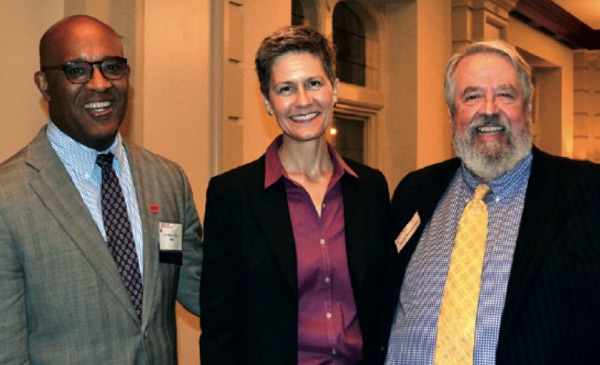Generous donors endow first lectureship on public health ethics
Named in honor of Professor Daniel Swartzman, the inaugural lecture drew nearly 150 attendees
Story text Heading link

On October 4, 2017, the UIC School of Public Health held its inaugural Daniel Swartzman Public Health Ethics Lecture. Named in honor of Mr. Swartzman, emeritus professor of health policy and administration, the lecture is the school’s first fully endowed lectureship. With more than 150 guests in attendance, Dr. Lisa M. Lee, founding chair of the American Public Health Association’s Ethics Section, delivered the keynote.
“Teaching ethics at a school of public health isn’t like other jobs, where you can get immediate feedback on how well you are doing. It may take years for your students to be able to benefit from what they have learned, and by then they are long gone,” explained Mr. Swartzman. “So, after spending 36 years at UIC, I have wondered at times how much my work had accomplished. To have my former students endow this lectureship and to have someone with the prominence of Dr. Lee give the inaugural lecture is tangible evidence that I must have been doing something right. Every teacher should be so lucky!”
Mr. Swartzman was a founding faculty member and served as the school’s first Associate Dean for Student Affairs. He taught courses in ethics, law, public policy, advocacy, management and strategic planning, thus having an impact on the educational experience of thousands of students. As a gifted teacher, he was well liked by his students, who affectionately call themselves “Dan Fans.”
“Our original goal was to raise $25,000 to establish an ethics lecture. However, we were pleasantly surprised by the generous response of our donors and surpassed this goal to reach $100,000, which is the level required by the University to endow a full lectureship,” explained Tamara Josserand, Assistant Dean for Advancement. “So many of Dan’s former students, including one significant anonymous donor, helped us reach this endowment level.”
Mr. Swartzman and colleagues like Dr. Lee who study ethics want the field of public health to ask questions like “why we in public health do what we do?” and “what are the moral arguments in favor of strong public health programs and policies?” and “how good are we, as a country, at making the tough moral choices that are presented by public health problems?” He argues that most public health professionals are responding to a calling, to the “urge to care for the other.” That idealism, which motivates our decisions to base our careers on being of help to others, and to base our policy prescriptions on moral precepts, is undermined by political systems that systematically avoid the responsibility to make moral choices. This is a critically important, but less understood and mostly under-studied, part of public health ethics. For this reason, the endowed lectureship will ensure that the area of public health ethics will forever be a part of the discourse at the UIC School of Public Health as we educate tomorrow’s best and brightest leaders.